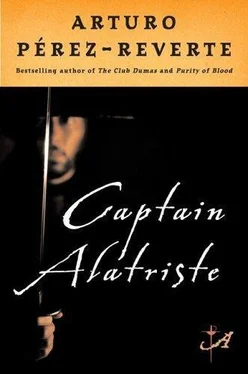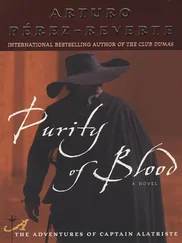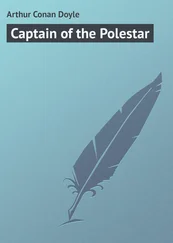Arturo Perez-Reverte - Captain Alatriste
Здесь есть возможность читать онлайн «Arturo Perez-Reverte - Captain Alatriste» весь текст электронной книги совершенно бесплатно (целиком полную версию без сокращений). В некоторых случаях можно слушать аудио, скачать через торрент в формате fb2 и присутствует краткое содержание. Жанр: Старинная литература, на английском языке. Описание произведения, (предисловие) а так же отзывы посетителей доступны на портале библиотеки ЛибКат.
- Название:Captain Alatriste
- Автор:
- Жанр:
- Год:неизвестен
- ISBN:нет данных
- Рейтинг книги:3 / 5. Голосов: 1
-
Избранное:Добавить в избранное
- Отзывы:
-
Ваша оценка:
- 60
- 1
- 2
- 3
- 4
- 5
Captain Alatriste: краткое содержание, описание и аннотация
Предлагаем к чтению аннотацию, описание, краткое содержание или предисловие (зависит от того, что написал сам автор книги «Captain Alatriste»). Если вы не нашли необходимую информацию о книге — напишите в комментариях, мы постараемся отыскать её.
Captain Alatriste — читать онлайн бесплатно полную книгу (весь текст) целиком
Ниже представлен текст книги, разбитый по страницам. Система сохранения места последней прочитанной страницы, позволяет с удобством читать онлайн бесплатно книгу «Captain Alatriste», без необходимости каждый раз заново искать на чём Вы остановились. Поставьте закладку, и сможете в любой момент перейти на страницу, на которой закончили чтение.
Интервал:
Закладка:
It was a long and very hard day. And in order that Your Mercies may picture what happened, only two of the Spanish made it back to the other bank of the river by the time night fell. Diego Alatriste was one of them, and as all day long he had commanded the troops—the authentic captain having been rendered hors de combat in the first skirmish with two handspans of steel protruding from his back—the title fell to him, though he had no opportunity to enjoy the honor. Captain-for-a-day of troops fated to die, and paying their way to Hell at the cost of their hides, one after another, with the river to their backs and blaspheming in good Castilian Spanish. But that is the way of war and the maelstrom. That is the way it goes with Spain.
Well, then. My father was the other Spanish soldier who returned that night. His name was Lope Balboa; he was from the province of Guipuzcoa, and he, too, was a courageous man. They say that Diego Alatriste and he were very good friends, almost like brothers, and it must be true, because later, on the bulwarks of Julich, where my father was killed by a ball from a harquebus—which was why Diego Velazquez did not include him in his painting of the Surrender of Breda, as he did his friend and fellow Diego, Alatriste, who is indeed there, behind the horse—he swore that he would look after me when I grew out of childhood. And that is why, when I turned thirteen, my mother supplied me with shirt and breeches, and a rosary and a crust of bread tied up in a kerchief, and sent me to live with the captain, taking advantage of a cousin who was traveling to Madrid. Thus it was that I came to enter the service, at a rank somewhere between servant and page, of my father's friend.
A confidence: I very much doubt whether, had she known him well, the mother who gave me birth would so gaily have sent me to his service. But I suppose that the title of captain, though apocryphal, added sheen to his character. Besides, my poor mother was not well and she had two daughters to feed. By sending me off she had one fewer mouth at table and at the same time was giving me the opportunity to seek my fortune at court. So, without bothering to ask further details, she packed me off with her cousin, together with a long letter written by the priest of our town, in which she reminded Diego Alatriste of his promise and his friendship with my deceased father.
I recall that when I attached myself to the captain, not much time had passed since his return from Flanders, because he carried an ugly wound in his side received at Fleurus, still fresh, and the source of great pain. Newly arrived, timid, and as easily frightened as a mouse, on my pallet at night I would listen to him pace back and forth in his room, unable to sleep. And at times I heard him softly singing little verses, interrupted by stabs of pain: Lope's verses, then a curse or a comment to himself, partly resigned and almost amused. That was typical of the captain: to face each of his ills and misfortunes as if they were a kind of inevitable joke that an old, perverse acquaintance found entertaining to subject him to from time to time. Perhaps that was the origin of his peculiar sense of harsh, unchanging, despairing humor.
That was a long time ago, and I am a bit muddled regarding dates. But the story I am going to tell you must have taken place around sixteen hundred and twenty-something. It is the adventure of masked men and two Englishmen, which caused not a little talk at court, and in which the captain not only came close to losing the patched-up hide he had managed to save in Flanders, and in battling Turkish and Barbary corsairs, but also made himself a pair of enemies who would, harass him for the rest of his life. I am referring to the secretary of our lord and king, Luis de Alquezar, and to his sinister Italian assassin, the silent and dangerous swordsman named Gualterio Malatesta, a man so accustomed to killing his victims from behind that when by chance he faced them, he sank into deep depressions, imagining that he was losing his touch. It was also the year in which I fell in love like a bawling calf, then and forever, with Angelica de Alquezar, who was as perverse and wicked as only Evil in the form of a blonde eleven- or twelve-year-old girl can be. But we will tell everything in its time.
My name is Inigo. And my name was the first word Captain Alatriste uttered the morning he was released from the ancient prison in the castle, where he had spent three weeks as a guest of the king for non-payment of debts. That he was the king's "guest" is merely a manner of speaking, for in this as in other prisons of the time, the only luxuries—and food was included as such—were those a prisoner paid for from his own purse. Fortunately, although the captain had been incarcerated nearly innocent of any funds, he had a goodly number of friends. So thanks to one and then another fellow who came to his aid during his imprisonment, his stay was made more tolerable by the
stews that Caridad la Lebrijana, the mistress of the Tavern of the Turk, sometimes sent by way of me, and by the four reales sent by his companions Don Francisco de Quevedo and Juan Vicuna, among others.
As for the rest of it, and here I am referring to the hardships of prison life itself, the captain knew better than any how to protect himself. The practice of relieving one's wretched companions-in-misfortune of their wealth, clothes, even their shoes, was notorious at that time. But Diego Alatriste was quite well known in Madrid, and any who did not know him soon found it was better for their health to approach him with caution. According to what I later learned, the first thing he did, once inside the walls, was to go straight to the most dangerous ruffian among the prisoners and, after greeting him politely, press the cold blade of that lethal vizcaina —which he had kept thanks to the transfer of a few maravedis to the jailer—to the thug's gullet. It worked like a sign from God. After this unmistakable declaration of principles, no one dared lift a hand against the captain, who from then on slept in peace, wrapped in his cape in a reasonably clean corner of the establishment and protected by his reputation as a man with steel in his spine.
Later, his generous sharing of La Lebrijana's stews, as well as bottles of wine bought from the warden with the assistance of friends, helped secure him solid loyalties, even from the lowlife of that first day, a man from Cordoba with the unfortunate name of Bartolo Cagafuego. Although carrying the burden of a name like Bartolo Shitfire was reason enough to get him into trouble as regularly as a pious old dame goes to mass—and though he had spent more than his share of time in the king's galleys—he was not a rancorous fellow. It was one of Diego Alatriste's virtues that he could make friends in Hell.
It seems unreal. I do not remember the exact year— it was the twenty-second or twenty-third year of the century—but what I am sure of is that the captain emerged from the prison on one of those blue, luminous Madrid mornings so cold that it takes your breath away. From that day—though neither of us yet knew it—our lives were going to change greatly.
Time has gone by and water has flowed beneath the bridges of the Manzanares, but I can still see Diego Alatriste, thin and unshaven, stepping across the threshold with the heavy iron-studded door closing behind him. I recall him perfectly, squinting in the blinding light, thick mustache covering his upper lip, slim silhouette wrapped in his cape, and beneath the shadow of his wide-brimmed hat, bedazzled eyes that seemed to smile when he glimpsed me sitting on a bench in the plaza. There was something very unusual about the captain's gaze; on the one hand, his eyes were very clear and very cold, a greenish-gray like the water in puddles on a winter morning. On the other, they could suddenly break into a warm and welcoming smile, like a blast of heat melting a skim of ice, while the rest of his face remained serious, inexpressive, or grave. He had another, more disturbing, smile that he reserved for moments of danger or sadness: a kind of grimace that twisted his mustache down slightly toward the left corner of his mouth, a smile as threatening as cold steel—which nearly always followed— or as funereal as an omen of death when it was strung at the end of several bottles of wine, those the captain dispatched alone in his days of silence. The first one or two downed without taking a breath, then that gesture of wiping his mustache with the back of his hand while staring at the wall before him. Bottles to kill the ghosts, he always said, although he was never able to kill them completely.
Читать дальшеИнтервал:
Закладка:
Похожие книги на «Captain Alatriste»
Представляем Вашему вниманию похожие книги на «Captain Alatriste» списком для выбора. Мы отобрали схожую по названию и смыслу литературу в надежде предоставить читателям больше вариантов отыскать новые, интересные, ещё непрочитанные произведения.
Обсуждение, отзывы о книге «Captain Alatriste» и просто собственные мнения читателей. Оставьте ваши комментарии, напишите, что Вы думаете о произведении, его смысле или главных героях. Укажите что конкретно понравилось, а что нет, и почему Вы так считаете.










